

For the Love of Interfaith: The Birth of Programming
By Molly Balison
Throughout Morgan Bernal’s childhood, a spiral of instability led her to live in a variety of places including her grandparents house, motels, and a shed without power or water alongside her 13-year-old sister Brittany, her mother, and her mother’s boyfriend. Her divorced parents, struggling with addiction, moved her and Brittany back and forth between California and Idaho, depending on who was more stable at the time. She remembers lying in the twin-sized bunk bed she shared with her older sister, hoping things would get
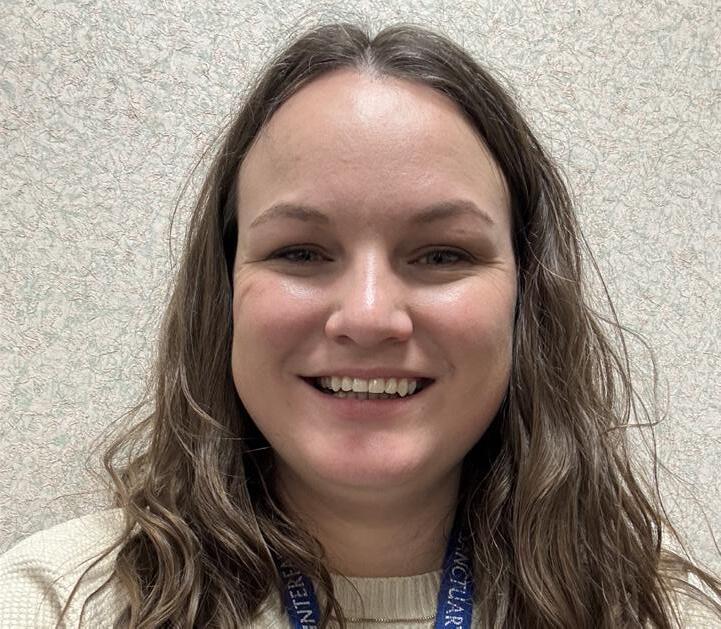
better—too young to fully grasp the depth of the instability around her.
When Bernal was eleven, her 21-year-old sister, Ashley, found out her younger sisters were living in a shed and requested to take custody of her and Brittany. They spent two years in California before moving to Idaho to be near their eldest sister. Together, the four girls began to rebuild their family. That change inspired their mother to pursue recovery, seek freedom from addiction, and find work as a truck driver. The emotional upheaval and displacement Morgan experienced as a child lit a fire in her to one day help others through similar circumstances.
Now a Director at Interfaith Sanctuary, Bernal shares a deep empathy with the guests she serves—many of whom have lived through stories that mirror her own. She first encountered shelter work in May 2016 while studying social work. She joined Interfaith Sanctuary as a case manager, became the volunteer coordinator, and
today, directs our hotel shelter, which houses both our Family and Medically Fragile Programs.
“I’ve learned that everyone has their own struggles and that their life story is more complex than recent events,” she said. “This work has made me a kinder and more supportive person.”
Interfaith Sanctuary was founded on the belief that everyone deserves a safe place to rest—regardless of race, religion, sexual orientation, or gender identity. The original shelter had two distinct sides: one for single adults, and the other for families—accommodating up to 50 family members in a dorm-style setup that created a village-like atmosphere. Families supported one another during this deeply challenging time. However, there was one major challenge: families had a place to stay at night but were forced to leave during the day and return at 5 p.m.
In 2017, a case manager submitted a proposal to Executive Director Jodi Peterson-Stigers to create programming that would allow families to stay sheltered 24/7 and receive wraparound services to stabilize and move forward.
That vision became the Family Daytime Program, offering case management and life skills training such as parenting, budgeting, stress management, GED preparation, and job interview coaching. According to Bernal, most families who complete the program do not return to homelessness.
While parents attended group classes, volunteers led preschool activities for children—circle time, songs, stories, and outdoor play on a playground donated by Bishop Kelly PATH.
When the pandemic hit in 2020, the Family Program transitioned into a hotel model with support from local government funding. Programming continued, and families finally had access to private rooms, bathrooms, and dedicated space to rebuild.
“I just want to make sure that parents have the tools they need to be the best they can for their kids,” Bernal said.
The impact has been profound. Staff members regularly witness guests overcome
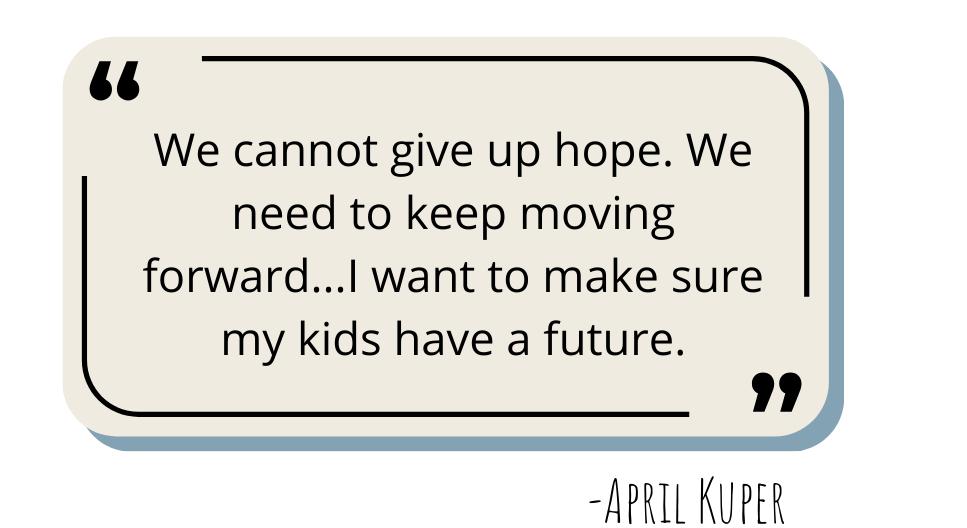
trauma, heal, and grow into more confident versions of themselves.
“Recently, we helped a single mom and her teenage son flee domestic abuse. They came to us with no resources, and we wrapped them in services and support. They moved into a sustainable living situation, and the mom still expresses deep gratitude for our team,” Bernal said.
As COVID relief funding decreased, the number of available hotel rooms dropped— from 57 to just 15. But the stories of transformation remained powerful.
April Kuper, a former guest and mother of four, entered the hotel program in 2021 during one of the hardest years of her life. After becoming homeless, she was diagnosed with breast cancer. “Having that living space to have my family together again was a big highlight,” she said. “We
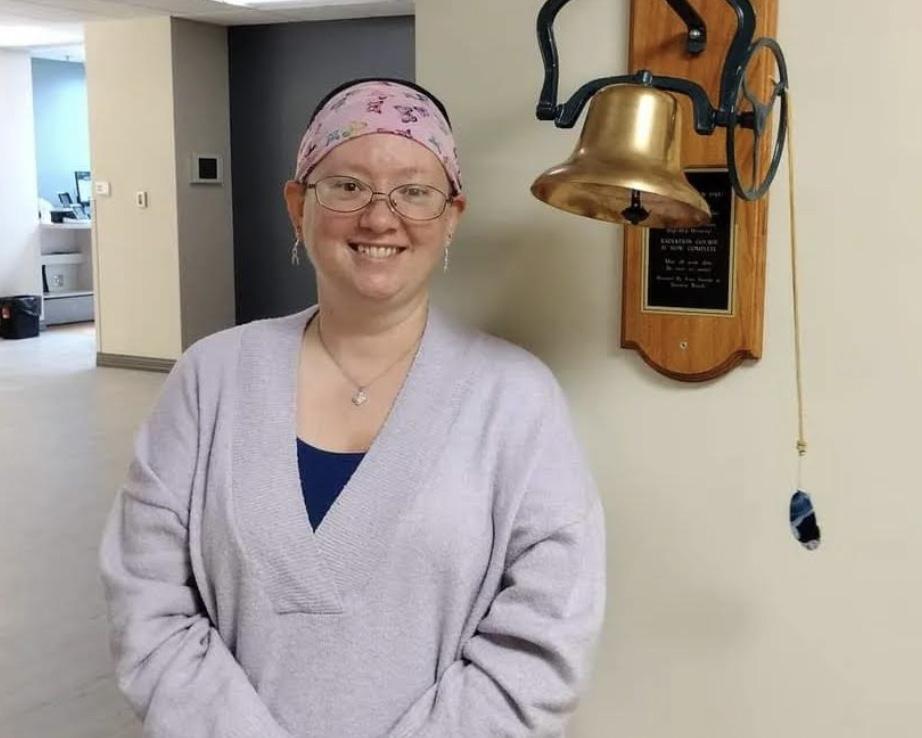
weren’t separated—just having that meant everything.”
Her children, ages 14, 11, and 7, helped clean and keep the room in order while she rested. Summer programs gave them fun, enriching experiences—movie outings,
day camps, and trips to Bogus Basin. Her 20-year-old son entered Interfaith as a single adult and, with the help of staff, earned his GED, got his driver’s license, and gained valuable job experience.
Interfaith’s support helped Kuper rediscover her love for writing despite struggles with dyslexia and ADHD. Today, she’s a published author of five books—stories that started while she was still in shelter.
Seeing other guests find housing gave her hope. “I never gave up thinking, ‘That will be us soon,’” she said.
The growing need to serve more families and individuals motivated the creation of Interfaith Sanctuary’s new State Street campus. Staff are hopeful that its thoughtful design—including private rooms, more bathrooms, an outdoor playground, and learning spaces—will continue the healing work that began in the hotel program.
“I believe the design incorporates the best pieces of what made the hotel model successful,” Bernal said. “It brings together privacy, safety, and opportunity for growth.”
As Executive Director Jodi Peterson-Stigers stepped into leadership, Bernal noticed the family program grow in both scope and compassion. Seeing someone care about their situation gives families hope. And hope is a powerful step toward stability.
“They’re such caring people,” Kuper said of the Interfaith team. “Their hearts went out and they wanted to do so much. They gave us everything they could.”
She said the biggest lesson she learned from spending two years at Interfaith was, “never give up hope.”
Word on the Street
PO BOX 9334
511 S Americana Blvd
Boise, ID 83702
EDITOR IN CHIEF
Molly Balison
WOTS WRITERS/COLUMNISTS
Bo Gerri Graves
Viola Crowley
Nate Dodgson
Eric Endsley
Jodi Peterson-Stigers
Molly Balison
Nicki Vogel
WOTS Historian
Nicky MacAislin
WOTS STREET PHOTOGRAPHERS
Heather Baird
Gypsy Wind
Eric Endsley
ART COLLECTIVE DIRECTOR
Chris Alvarez
CONTACT THE EDITOR
To submit story ideas or community articles, please send request and information to molly@interfaithsanctuary.org
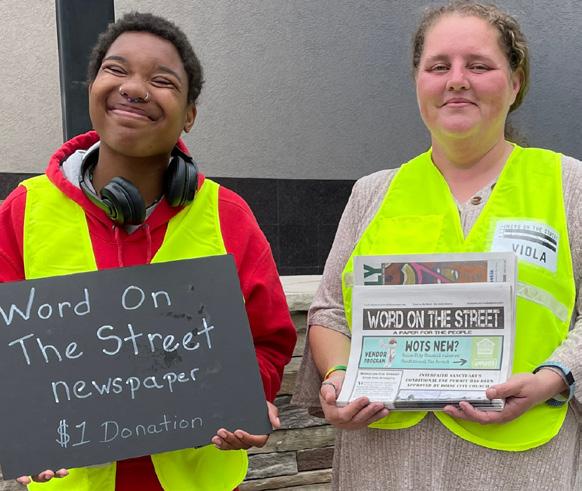
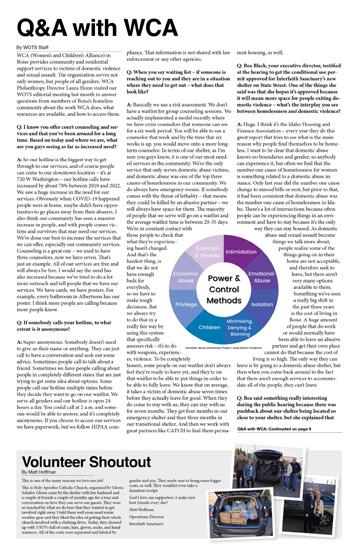
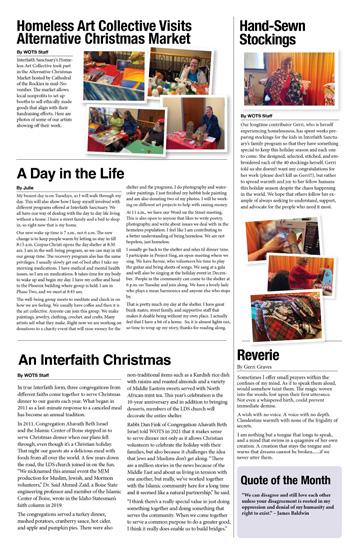
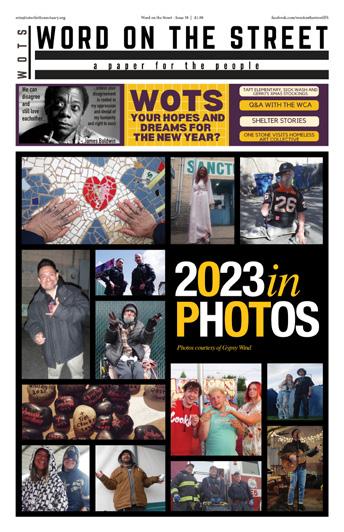
POETRY CORNER
Soon The Break Up A Sweet Season
By Viola Crowley By Eric Endsley
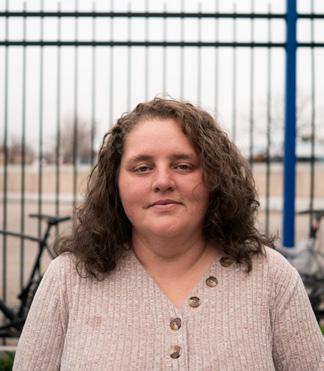
Soon you will be celebrating your recovery.
Soon you will find yourself ‘put together’. Soon you will get your head on straight. Soon you will get the job you need.
Soon you will find the house you deserve. Soon you will find the chains of your past broken.
Soon you will find the weight your are carrying lift off you.
Soon you will find a new spark of joy. Please remember that no matter what you are going through, things will get better. Even if it doesn’t feel like it right now, I promise that you will make it through these turbulent times to become a stronger and wiser person. Soon, my friend, soon!
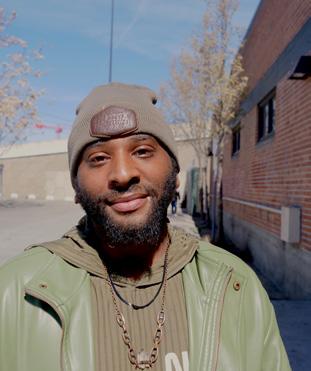
He tells me, ‘Open your eyes.’ He said I’m growing uptight. He said I’m drowning in lies and that I’m giving B-sides. He’s in the midst of unties. He’s on the mass of my shrine. And if I get to hell on foot, he’d be happy, obliged.
Inverted slivers of my lonely pieces. My being as whole as ancestors repeated. I will forgive them; it’s my life, I mean it. But myself is sin that cannot be treated. Bad things aren’t hard to digest. I knew nothing of regret.
He was mad, and I’m cunning. And all I could take was the rust in my veins and the sweetness of the ride. He’s mad, I’m cunning. It’s the end of the road, and I’ve taken your time.
Well, he’s incessant, and I’m embarrassed, with so much more than tainted, traded lives. Maddened by cunning. He fiends like he needs it; he’s over my time. In and out loud, with a reason to ride.
Well, now he’s dancing in the stables; it’s a giddy-up ride. And he’s heaven in hiding; he’s my true potential. I missed it, and lost him; it’s not confidential. Bad things aren’t hard to digest; I knew nothing of regret.
By Molly Balison
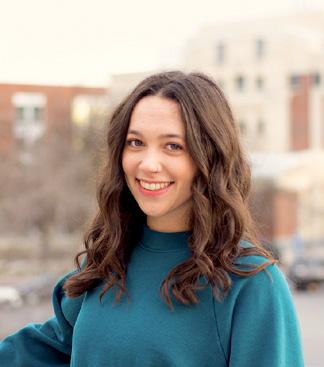
Oh Lord, Sitting at your feet
Stillness in your presence, Slow my racing mind. Striving is exhausting, Sabbath is rare, See me through a sweet season.
Saturate my mind with you, Scripture resonating, Spirit transforming. Speak to me
Sweet messages of love, Shouts of breakthroughs. Steadfastness in you, Steadiness in relationships. Sleeping peacefully, Stewarding wisely, See me through a sweet season.
Surrendering my plans, Sabbathing my Sundays, Submitting to your will. Sing to me
Serenades of joy, Seeking you and all I do, Staying faithful and humble, Sowing seeds in a final semester, See me through a sweet season.

Road to Redemption Part 4: The Steps
By Bo
I must start off by giving all the glory to my Lord and Savior Jesus Christ who made all things possible.
When I lost my job at Amazon due to a foot injury, I lost my housing. Three weeks before losing my place I tried to work with my property management, hoping my new job would be enough income to stay on top of rent. However I prayed and kept saying, “Lord let your will be done, not mine.”
When I finally lost my place, it challenged me to remain faithful. I ended up spending the money I had on getting a room for two weeks. That’s when the struggle got serious. After my money ran out I ended up staying
with my homie who I used to work with at Amazon. He was going through a divorce at the time and I knew that me being there was just more strenuous. I felt the same when my cousin came to understand the dynamic of living together. Not a burden, but knowing that it’s going to be a topic that will be an argument later on.
I put in resumes at many jobs and waited. I would leave with the homie while he went to work. Which means I would sit in his Jeep because I had nowhere else to go during his twelve hour shift and couldn’t walk on my foot that will be messed up for life.
I’m only saying that to highlight the feeling of being hurt and at that job for basically thirteen hours a shift normally. It was triple
digits and I was stuck in a Jeep. Rolling down the windows meant people could see me all day long. So I would put up a T-shirt on the windows to hide myself. My homie made jokes and comments insinuating that I’m making his jeep look like a refuge camp. It was an extremely humbling and embarrassing situation.
I ended up staying with my homie for like two weeks before I finally went to the shelter. I had him take me to donate plasma first so I could have 40 dollars in my pocket. I sat in the alley for a minute outside the shelter feeling ashamed, low and rejected. Ironically it was the same shelter me and my cousin were at. I felt his spirit heavily and I couldn’t bring myself to go into the shelter. I reached out to a
woman on Plenty of Fish but had never met before who picked me up and she gave me a place to stay for the night.
The next morning I left around 6 a.m. and went to the Boise Rescue Mission’s men’s shelter, River of Life, even though I couldn’t check in until 4 p.m. I had three bags of my belongings with me and didn’t know where to go next. The need to go to the bathroom brought me to Corpus Christi House (now Corpus Commons) on Americana Blvd. This is where my steps were, again, led by the Lord.
ART COLLECTIVE
Photos By Gypsy Wind
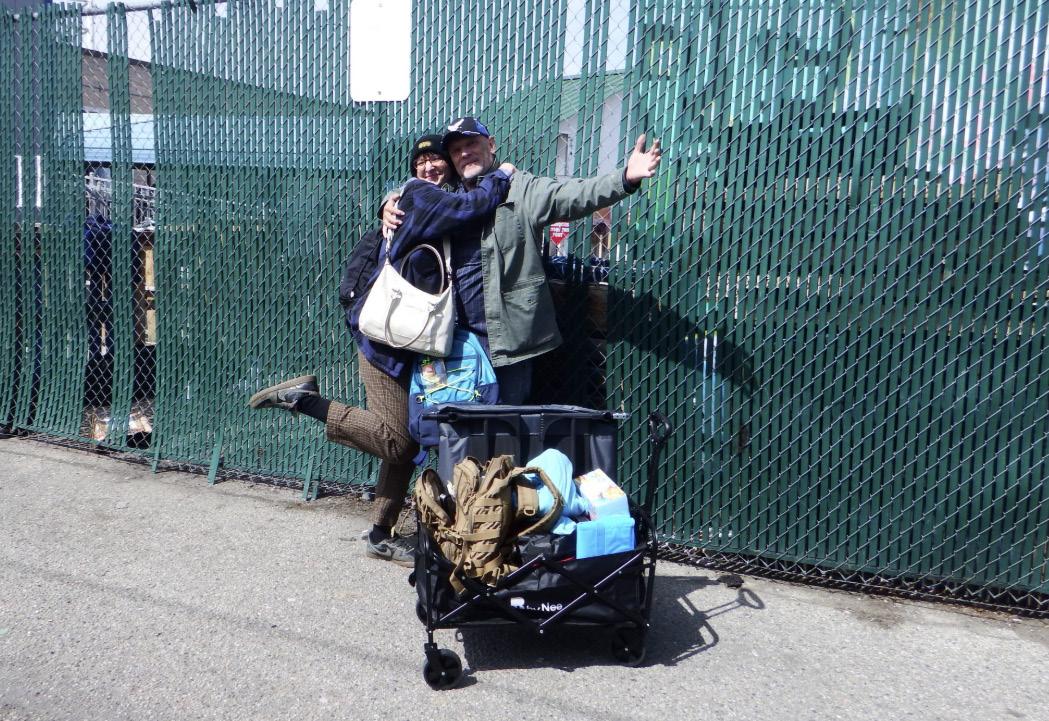

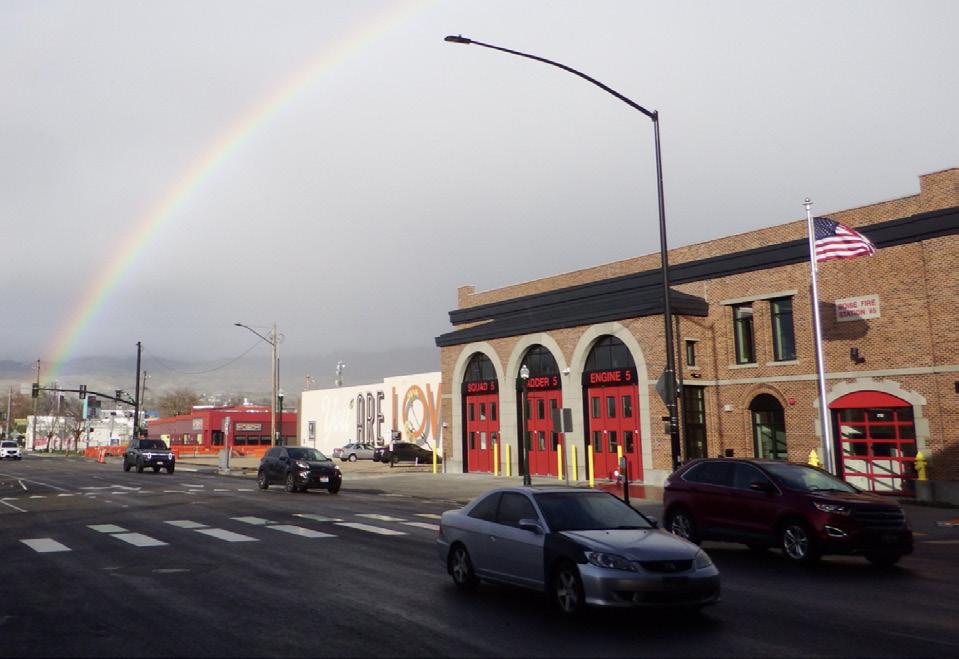

Shelter: More than a Word
By Molly Balison
When you input the word “shelter” in a search engine, images of huts and leantos made from tree branches and logs appear under the definition “a place giving temporary protection from bad weather or danger.”
Before working at Interfaith, I thought of shelter as a roof over my head and a place to hide away from the elements as a means of survival. After becoming part of the Interfaith team, I see that the shelter also looks like the single-level tan and blue facility on River Street with a mural displaying the words “compassion”, “dignity”, “respect”and “community”. These qualities are what make Interfaith Sanctuary’s emergency shelter not just a place for survival, but a refuge that restores love and hope for the lost and displaced. Compassion (n). “Sympathetic pity and concern for the sufferings or misfortunes of others.”
Miriam Webster’s Dictionary defines shelter as “an establishment providing food, protection, and temporary housing for people who need assistance”. Yes, a shelter houses the displaced, yet it’s more than a building. What happens inside sets the facility apart. Countless guests say that Interfaith saved their life and helped them get back on their feet. That kind of work takes compassionate effort that goes beyond warehousing people.
Dignity (n). “The state or quality of being worthy of honor or respect.”
Some compare the rows of bunk beds to rows of shelving in a warehouse. That’s why the new shelter being built on State Street is thoughtfully and intentionally designed to give guests the privacy, dignity and respect everyone deserves. Every human being regardless of circumstances is worthy of a place to lay their head in safety.
Respect (n). “A feeling of deep admiration for someone or something elicited by their abilities, qualities, or achievements.”
Those serving the community within a shelter have the power to make people feel respect. Both staff and volunteers at Interfaith are trained to care for individuals. Folks who are used to being overlooked or kicked to the curb may not believe they are worthy of respect, but when they find a place where they are treated as a human with value, they feel empowered and encouraged.
Community (n). “A group of people living in the same place or having a particular characteristic in common.”
Opportunities to heal the mind, body and soul through programming brings hope and purpose into the lives of the unhoused. Communities are built within Project Wellbeing, Project Recovery, Family Program, Pain Warriors, Project Sing, the Homeless Art Collective and Word on the Street as people bond over shared experiences and common interests. People in programming want to better themselves and help others be a better version of themselves.
Interfaith is a place of refuge and safety. Shelter is a sanctuary.
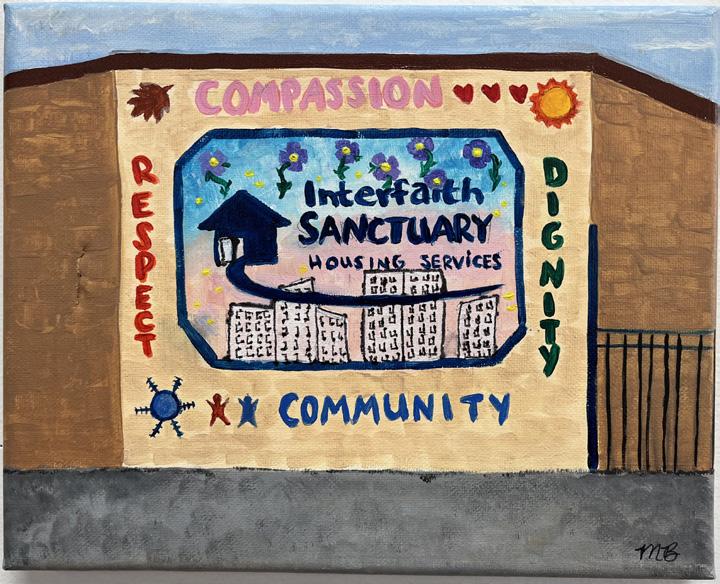

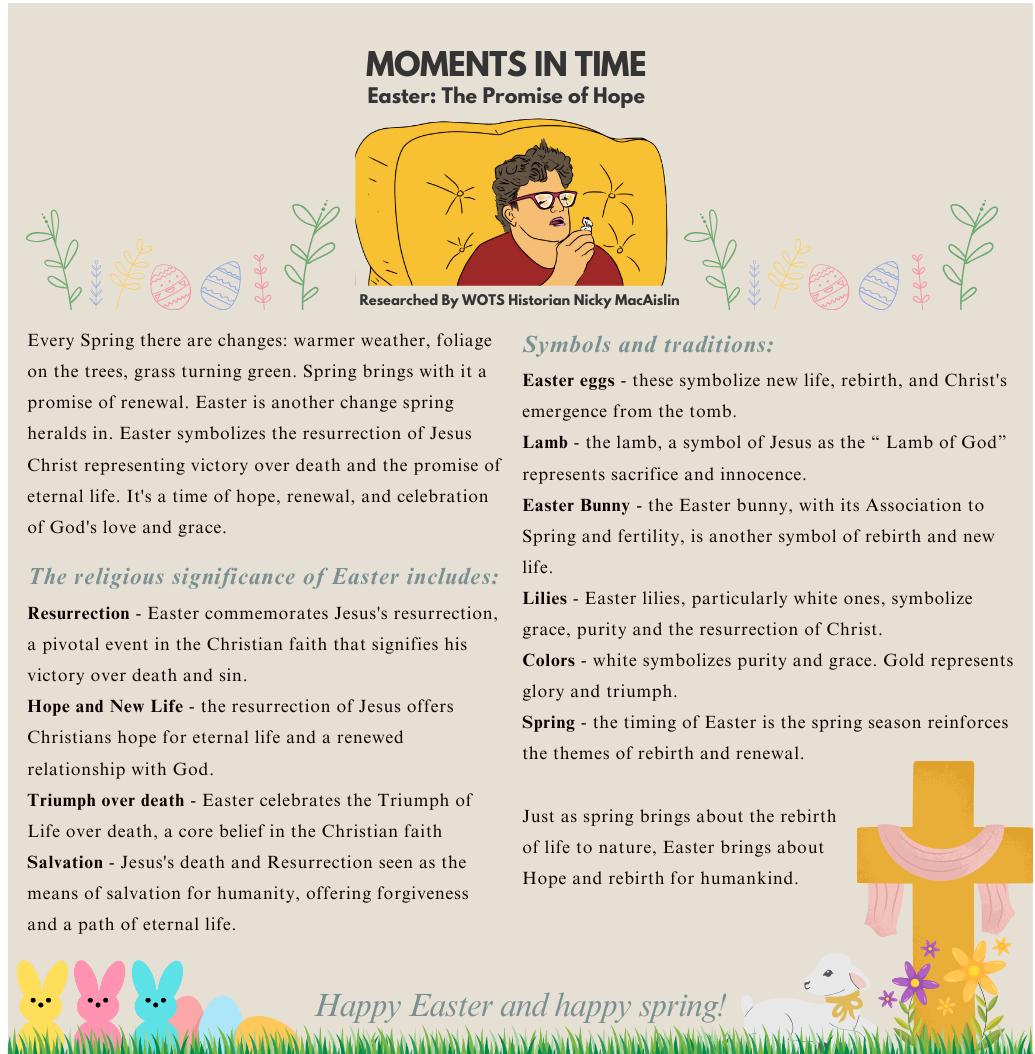
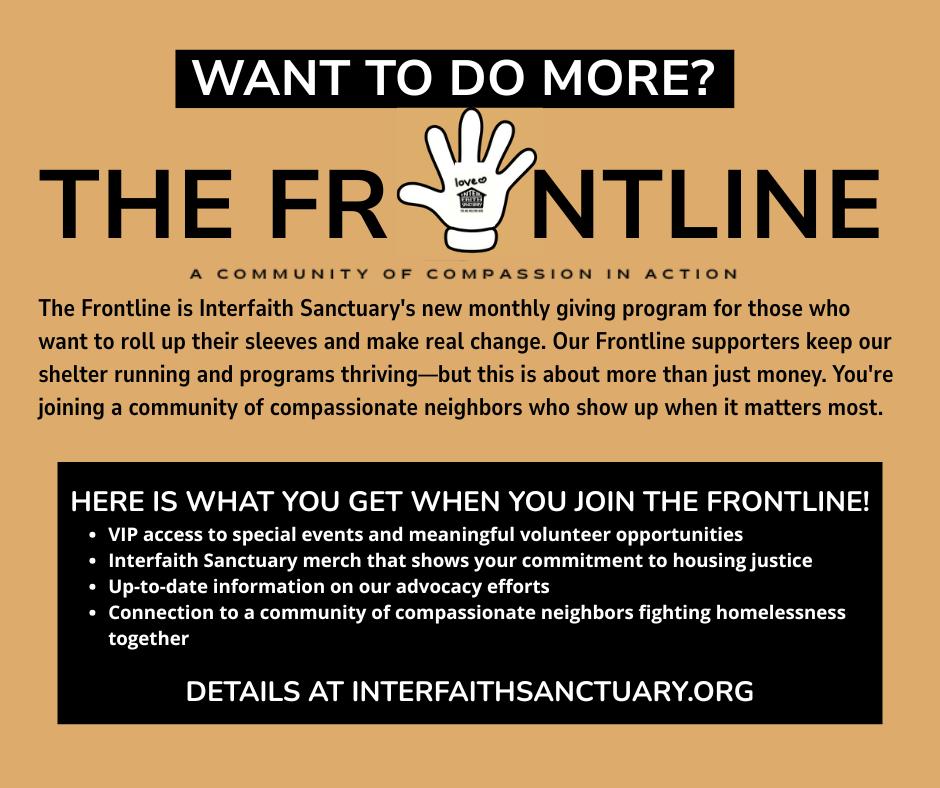
Photos By Molly Balison
Painting by Molly Balison
Terry Reilly Tips: Stress
By Claudia Weathermont
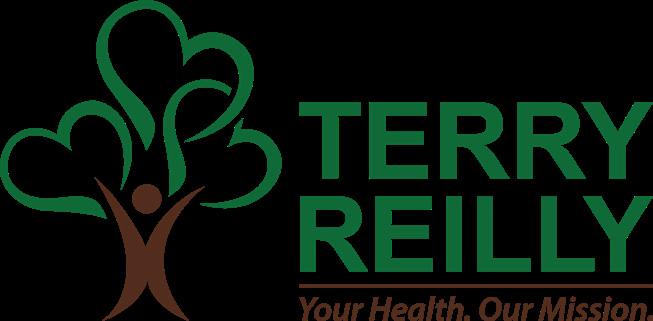
April is Stress Awareness Month, and while we often think of stress as something we deal with alone, the truth is that stress is deeply connected to our communities. When we feel supported, seen, and cared for, life’s stressors become easier to navigate. But when we struggle with things like housing, food access, or isolation, stress can feel overwhelming. This overwhelm isn’t just true for one person, but for an entire neighborhood.
• Share information about local services like food banks, housing assistance, or free clinics.
• Advocate for policies that support affordable housing, mental health access, and food security.
• Plan outdoor activities like group walks, or picnics at the park.
• Engage in a mental health workshop on stress management, mindfulness, or coping skills.
• Host game nights, movie screenings, or book clubs to bring people together for fun.
• Encourage open conversations about mental health to reduce stigma.
WOTS
WOTS
DEEDS ON THE STREET
The good news? We don’t have to face it alone. Communities thrive when people show up for each other in big and small ways. A simple check-in with a neighbor, sharing a meal, or offering a listening ear can remind someone they’re not alone. Here are some other ideas to consider:
• Lead with kindness. Small acts like a smile, a compliment, or an encouraging note can make a big difference.
Stress may be a part of life, but we do not have to carry it alone. When we show up for one another with kindness, support, and connection, we create a community where everyone has the chance to breathe a little easier. Let us keep building a world where stress is met with care, struggles are met with support, and no one must face life’s challenges alone.

DEEDS ON THE STREET
FRONTLINE FORCE
By Jodi Peterson-Stigers
We Stopped Bill 1166—But the Work Isn’t Over
We’re relieved to share that House Bill 1166, which would have blocked our ability to open the new Interfaith Sanctuary shelter on State Street, has been killed. This is a huge victory— not just for us, but for every person in our community who believes in real solutions to homelessness and in treating our unhoused neighbors with dignity.
WOTS
But while we celebrate this win, we also face a new challenge. House Bill 1141, the anti-camping bill, has been signed into law. This legislation takes a punitive approach to homelessness that we know won’t solve the problem—it will only push people further into crisis.
become part of the movement. As a Frontline member, you’ll be invited to:
• Volunteer and serve alongside our team and guests
• Stand in unity at public hearings, like our upcoming Conditional Use Permit process
DEEDS ON THE STREET
This win would not have been possible without you. Thank you to everyone who stood with us—who spoke out, showed up, and refused to let fear and misinformation win. You helped protect a safe, supportive, and compassionate future for the people who need it most.
A Podcast for the People
Now, we turn our focus to the work ahead: advocating for a more supportive, less punitive approach to homelessness in Idaho. We will keep showing up. We will keep telling the truth. We will keep building the kind of community that lifts people up instead of pushing them down.
Want to do more? Join The Frontline. We’re launching The Frontline— Interfaith Sanctuary’s new recurring donor program for those who want to do more than just give. Our Frontline members commit to monthly support that helps keep our shelter running and our services sustainable, but they also
• Respond to urgent calls for help when our shelter or guests are in crisis
• Be a voice for compassion and justice in our community
This isn’t just about funding. It’s about showing up. It’s about walking the walk. Join us on the Frontline—and let’s keep building a future we can all be proud of! Details at www. interfaithsanctuary.org
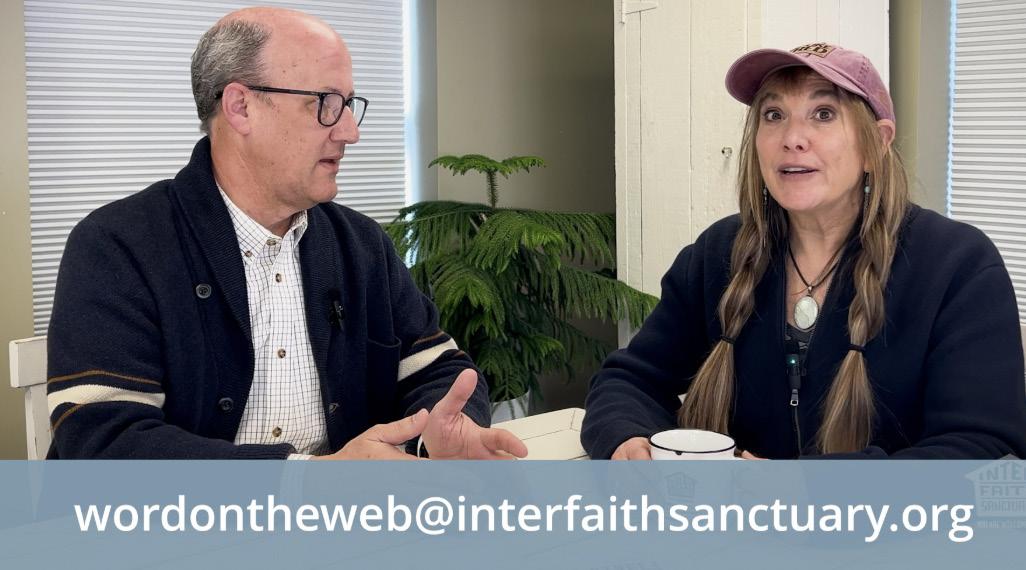
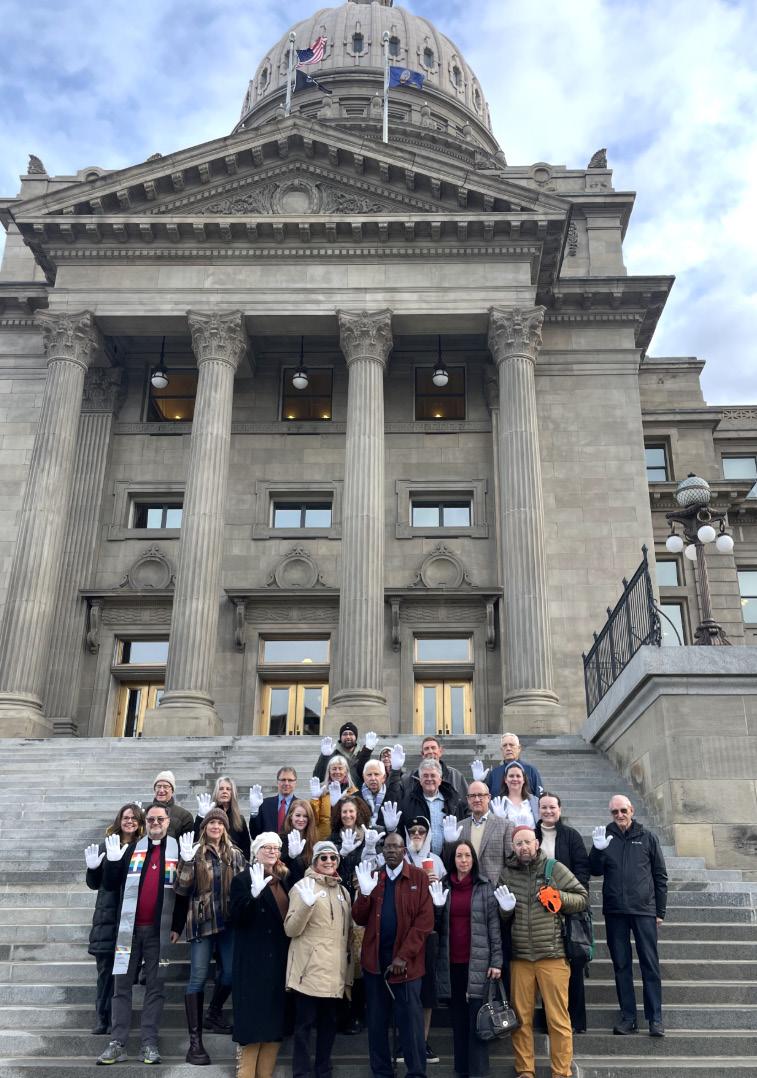
The fourth episode of “Word on the Web” is live! This week, Jodi and Nathan discuss Interfaith’s mental health program: Project Wellbeing.
“We saw them become their own person again and their personalities were revealed, and they started to ask for help.”
This podcast was inspired by you, and is designed to answer your questions and address the topics you care about most. What would you like to hear Jodi and Nathan discuss in upcoming episodes? You can click the button below to send in your requests!
SEASON OF HOPE
Once Adrift and Alone, Everett Man
Found His North Star in Life, Business and Community
By John Stearns
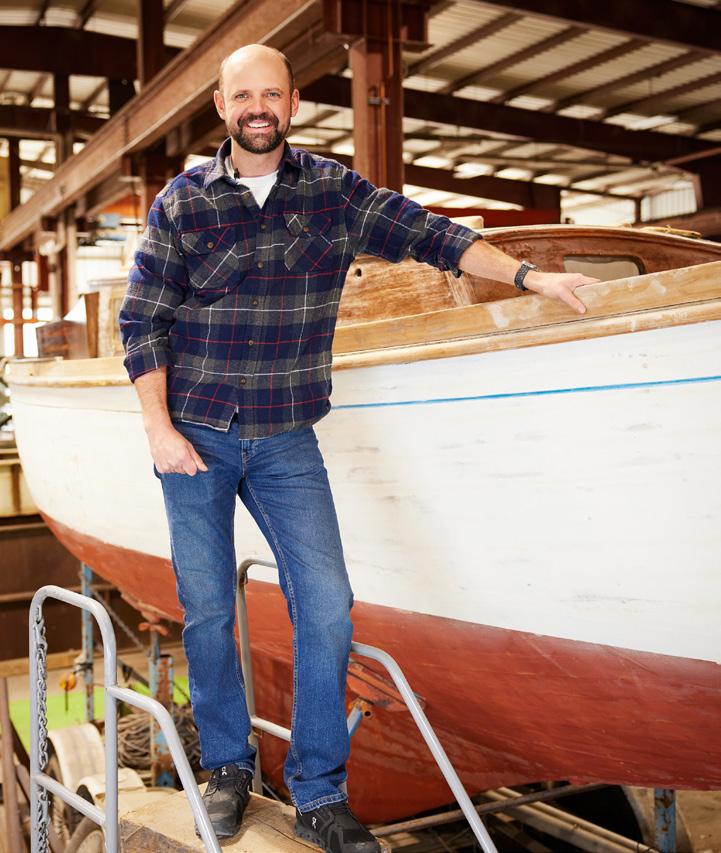
One could draw an analogy between Bryan Dennis’s boat repair and service business in Everett, Washington, and what he did to turn his life around.
“You can take something that was broken and make it whole again, and it’s a cathartic release to see that,” Dennis said of viewing the tangible results of hull repairs, engine overhauls or countless other repair and service jobs done by his company, Puget Sound Composites, also known as PSC Marine.
It was only eight years ago, in 2017, that Dennis was broken himself, adrift with literally nothing other than the clothes on his back and the few things he could carry in a gym bag. He was at the deepest point of a drug addiction that estranged him from friends and family, and nearly cost him his life—twice.
He credits God for his redirection.
Realizing he would be forgiven, he mustered the resolve to turn his life around. First, he got clean, then found employment. He began to save money and opened a secured checking account at Heritage Bank to begin rebuilding his financial life, too. He eventually landed a job at an Everett boatrepair facility that would open the doors to business ownership.
Today, when he looks at his reflection in a fiberglass hull he has refinished to a smooth, mirror-like finish, he takes pride in what he sees. The work is a bit like being a sculptor, he said of rebuilding the structure, matching the color and then meticulously applying the paint.
“It’s like a puzzle when you can restore it and look at yourself, and you’re facing that surface that you’ve just done. It’s kind of like what God did in my life,” he said, “and now that I feel like I restored my image the way God sees me, or I see myself. I kind of focus on the guys that I’ve got working with me. My vision for the future is to help people do that in their own lives.”
His immediate focus is PSC Marine and its customers, continuing to fine-tune and build a business that he launched four years ago and now has 10 employees. The shop’s work on pleasure and commercial crafts includes service and repair for composite, fiberglass, aluminum, wood and steel hulls;
painting; detailing and finishing; welding, repair and fabrication of aluminum, stainless steel and steel; brightwork; rigging; electrical; and myriad mechanical repairs and services. PSC works on everything from six-foot dinghies to 110-foot vessels.
Dennis is building his business on core fundamentals of honesty and integrity— doing things right, not cutting corners. That applies to the physical work on boats and interactions with customers, and it applies to the back-of-the-house work of running a business by the book. Operating PSC Marine that way provides a rock-solid foundation that’s sustainable, he said.
“Really, the vision I have is to get the business sustainable so that we can really have enough bandwidth to focus as much as possible on people,” Dennis said. That means being there for his employees, but he also wants others to know that God is there for them, too, that there’s hope. He believes feelings of hopelessness are pervasive in society today, from addictions, relationship struggles, gambling problems, business pressures and more.
“The feeling inside that I had of hopelessness I think is the same whether you’re a homeless, indigent drug addict or you are maybe a chief executive of a [company] and you feel like you’re about to lose your job, or you’re failing your stockholders and you’re thinking about taking your life,” he said. “The internal feeling is the same, and even though the contexts are different, the solution is the same, too.”
His story is ‘amazing’
PSC Marine’s banker at Heritage, Staci Lindstrand, said Dennis’s story is one reason she got into community banking.
“To overcome what he did to be where he is today is amazing and he is so completely humble. It is kind of inspiring, to be honest,” said Lindstrand, vice president and branch manager of the Everett office. “I think his perseverance and his commitment not only to himself but to the company that he built is amazing. And to be able to watch that growth as a banker is one of the most rewarding things for me. It’s why I’m in community banking is building those relationships and watching people grow.”
Lindstrand said it has been an honor for her to watch Dennis’s journey and see the success that he’s had.
“Honestly, it is truly just one of those oncein-a-lifetime stories where you connect with a business owner who just surprises you at every turn with their commitment and ability to overcome any obstacle that comes their way and remain positive and humble,” she said. “It’s amazing.”
Dennis started banking with Heritage in mid-2018, going there to cash his paychecks from a grocery store where he worked after treatment. Heritage offered him a secured checking account with overdraft protection and a chance to rebuild his credit.
Dennis, 39, traces his plunge into addiction to opioids after a teenage wisdom teeth
extraction about 2004. The opioid pain relief medication seemed to reduce stress, fears and anxieties he felt at that age, despite his good grades, athletics and other activities. He had a full-ride scholarship to attend college, which added more pressure. He continued taking opioids for several years to feel better about himself, a trend that took over his reasoning as he sought more pills to have the same effects. Eventually, he tried different drugs and the downward spiral intensified. By the end, he had done every drug in every way, from cocaine in Columbia to heroin on the streets of Everett. He was revived twice from near-death overdoses.
“I didn’t have any shoes on my feet and was walking around in psychosis,” he said, the pain of the memory evident in his voice. “I weighed 110 pounds, I had forgotten who I was, who my family was. I didn’t really have any identity anymore.”
In the pit of despair in 2017, walking a road in Everett, he approached law enforcement officers, admitted his addiction, that he had drugs in his possession and had stolen food to eat. They offered to help, including making appointments with doctors, buying him glasses to replace the ones he had lost, giving him gift cards for fast food joints and arranging lodging. They then got him to an inpatient facility, helped find transitional housing, then a job at a corner grocery store a couple blocks from his housing, where his mattress on the floor had a spring protruding from it. He mowed a nearby lawn in return for a bicycle to commute to drug-counseling sessions.
He began redirecting his path. He likened his previous life in drugs to a ship completely off-course, its compass at 180 degrees south. He started shifting his direction one degree at a time until his internal compass eventually swung 180 degrees and locked on his true north. He saved whatever money he could, got plugged into a local church, raised enough money for a car, then landed a job at the Port of Everett, where he worked for a marine repair shop. He sought work there because he had a love of water and knack for boat maintenance and rebuilds that he learned as a youth with his boat-owning stepfather.
Working in the marine repair shop, he continued to save, grow and learn. He connected with customers who appreciated his work, including many who were successful business owners. He envisioned himself opening his own marine business someday. When the shop owner he worked for exited the business for health reasons, the door opened for Dennis’s dream. While he didn’t buy the business, he assumed its lease in the port and in 2021 began Puget Sound Composites from scratch, winning customers for whom he had already worked while adding new ones.
Customers with their own businesses offered advice along his entrepreneurial journey. Heritage, too, offered counsel and the financial instruments to assist his navigation.
“They helped me to save and counseled me and encouraged me,” Dennis said, complimenting Lindstrand and others in the branch for their attention. “It’s kind of become like a family,” he said. “They’re people that I trust, and they’ve come down and looked at my operation; it’s been really fun giving them tours.”
Today, he has several Heritage accounts: for savings, business, credit lines and credit cards.
“They were instrumental in helping me rebuild my credit as fast as possible,” Dennis said. He was able to buy a house, his business is debt free and he pays off his
credit cards monthly.
“I think Heritage was the only bank that was willing to give me a chance,” Dennis said. “That was what made the biggest difference for me. I think they’ve got a very competent, experienced staff; they answer the phone when you call; they are represented well in the region with locations and with ATMs; and they’re also very reasonable in their fees, just the structure of their accounts.”
Lindstrand said the bank has something akin to a “second-chance product” for people who’ve had previous banking issues, and Dennis made the most of his opportunity.
“I wish that you could bottle up that positivity and perseverance,” she said, “and I just think he could be such an encouragement to so many other people, but he has always been just kind and humble and wanting to do the right thing and the best thing, and I think it’s taken him really far.”
Lindstrand said, “We want the best for our clients, regardless of how they came to us. So, I think if I’ve learned anything from Bryan, it’s that if you don’t give up on yourself, no one else can take you down.”
She’s excited to watch Dennis’s journey, calling him strategic and measured with his growing business.
“I think if he continues on this path, there’s just no limit to what we’re going to see from him,” Lindstrand said.
Giving back
Dennis is in a good place mentally, physically and spiritually. That includes being newly married; he and Shannon, a teacher at a private Christian school, wed in March 2024.
With his life solidly on course, he’s rewarded now by helping others, whether his PSC staff, tithing at his church, donating to the Sea Scouts, giving vehicles to single mothers or walking the streets of Everett to encourage people whose plight he understands.
Dennis was among 39 volunteer members of the Mayor’s Drug Crisis Task Force that was convened in February 2024 by Everett Mayor Cassie Franklin to address the city’s drug problem. A city report on the task force’s work says, “Over the course of four months, the task force developed a shared understanding of the local drug crisis and its effects on community safety, culminating in actionable recommendations that encompass short-term interventions and long-term solutions aimed at mitigating the crisis and enhancing public safety. The final recommendations aim to improve public safety and support the City’s most vulnerable populations, ensuring a safer and healthier Everett for all residents.”
Dennis—living proof that support and services can have dramatic turnaround effects—wants to bring hope and help to others who are struggling. He knows the pain his drug addiction caused his friends and family in the past as they tried to help, but whom he drove away, leaving him to feel the full consequences of his poor decisions.
“When I was finally alone, I think that’s when I developed a relationship with God, because there wasn’t anybody else,” he said, adding that all his relationships have since returned to levels higher than they ever were. “But still, that primary hope that I have is not in my family, or my popularity, or my friends, or the wealth I now have. It’s in God.”

Franics, A Pope of Firsts
By Nate Dogson
Born on December 17, 1936, in Buenos Aires, Argentina, Jorge Mario Bergoglio would astound the world by, eventually, becoming the first pope of the Roman Catholic Church from the Western Hemisphere and South America. He would be donned Pope Francis (I) in March of 2013, and leads a progressive movement of revolutionary reforms stretching broad amongst social issues and entities most current and pressing to the consciousness of the global masses. Francis has swept and contended with the government, the health industry, and the church, as well as addressed issues such as climate change, nationalism, and extremist ideology.
On Valentine’s Day, the 88-year-oldpope began a thirty-eight day stay in the hospital where he underwent treatment for numerous life-threatening complications. Francis effectuated the convalescence of his bequest and awestruck even the physicians who claim his rehabilitation is nothing short of a miracle.
Francis is truly innovative on all fronts and never seems to miss the opportunity to reflect on and consider our own experiences as concepts being communicated from God. Francis conveys sympathy and compassion for the widespread oppression and affliction which has pulverized the lands of the Middle East as well as Eastern Europe. Children are especially and extremely vulnerable during these times of war-- war spurring famine, death, and genocide. Francis vocalizes his tender, merciful prayers for the children and ravaged families and their homes. He sees the lack of peace and horror resulting from continued strife and hatred between nations. He continuously, thus, calls for peace, and prayer-- peace, prayer; supplication being his admonishment for followers and devotees. Francis has his heart set towards children. But also, climate pledge is on the forefront of his papacy. Francis advocates for greater care and responsibility when it comes to environmental stewardship, and says, as much as we have cause for alarm, the matter of climate change still lacks appropriate urgency and response by all nations.
Bergoglio chose the name Francis in honor of St. Francis of Assisi (1181-1226), replicating virtues of humility and outreach to the poor and less fortunate; and St. Francis Xavier (1506-52), who co-founded the Society of Jesus, also referred to as

Jesuits. Francis was elected pope during a time of conjuncture involving the Roman Catholic Church. The clergy sexual abuse scandals during the late 20th century created much distrust and divisive sentiments within the world’s largest Christian church, which at 1.5 billion members comprises 1/6th of the world’s population. This stain on the church’s reputation has been a confronting challenge amongst other social and ethics issues, including women’s rights. Francis sympathizes with the cries for women’s equality, allowing advanced inclusion of women in certain rituals and observances, albeit short of endorsing ordination for priesthood.
Francis is the first pope from the Jesuit order and first pope to have met with leaders of the Russian Orthodox Churches. He also is the first pope to have addressed the United States Congress and first pope to visit the Arabian Peninsula, where he successfully hosted the largest Christian worship in the country’s history, attended by over 180,000 people. The pope has called on nations to open up borders to migrants and immigrants because, as he says, diversity is a necessary component in building healthy communities.
Tenderhearted, Pope Francis never stops ministering to the poor, destitute, and marginalized. His plea for their plight-- he knows what it’s like. Calling for equality and diversity, Francis admonishes members of the church to practice more “nearness, proximity” and to take a more kindly regard toward homosexuals.
The pope calls on us to remember our faith and the commitment of a follower of Christ and that delayed reward is in store for those who strive and endure with long suffering and patience. Pope Francis calls on us to pray for peace and health for others. Both quaint and modest in his dwelling, Francis fulfills the repute of his name and sacrifices luxury for simplicity. His holiness in meekness and modesty leaves a legacy of humility. There is a transformative direction without the church and the newest pontiff is truly a pioneer who could pave the way for further progressive momentum within the church, all the like. Pope Francis displays quiet strength and asceticism in its value: restrained, prepared, armored, ready for duty, yet gentle in his proceedings. A gentle strength. A new-age and a pope of many firsts.
What Sobriety Means to Me
By Viola Crowley
Sobriety is not just about refraining drugs and/or alcohol, it’s a way of life. It’s all about balance. Sobriety is working a program. Any program that works for you, work it. Sobriety is about service work. Give back wherever and whenever you can without depleting yourself. Sobriety is staying away from people who use unless it’s part of your service work. Then tread carefully. Sobriety isn’t about glorifying your past use. It’s about remembering why you don’t use anymore. Sobriety is self-care. Take
Interfaith and the LGBTQIA+ community
By Elliott Ragland and Eric Endsley
Interfaith sanctuary has been a great place for us to reside as homeless LGBT. Interfaith has given us a place to be ourselves and be who we are meant to be, our true authentic selves. It also has brought us together in ways that we would never have in the first place. Like how we were brought together to write this piece. Out in the world we may have never talked. Here Interfaith Sanctuary cares about us, we can confide in the staff here. People like Kate and Nicki are very kind and welcoming. We have the support we need to continue to be who we are and to get where we need to go and live till we can get our own place.
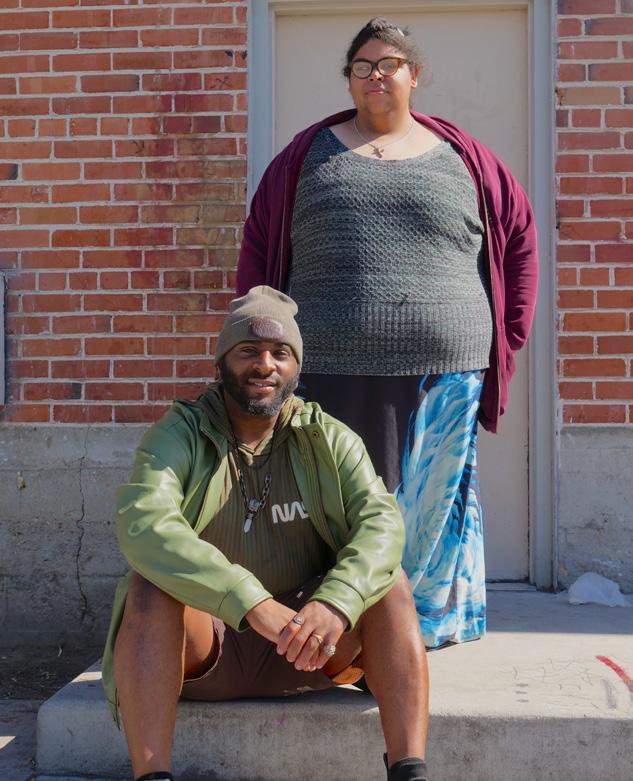
By Gypsy Wind
One day a scorpion walked up to a frog on the side of a river. The scorpion asked the frog “ please take me across the river” The frog responded “I don’t know, you are dangerous.” The scorpion pleaded with the frog, please I need to find a mate with my kind across the river. Reluctantly the frog said okay and the scorpion climbed onto the frogs back and they started to make their way across the river, when they were about half way across in the swiftest part of the current the scorpion strikes the back of the head of the frog, delivering a lethal dose of venom, as they are both are being swept away and dragged under the frog cries out to the scorpion, why did you sting me? You killed us both. The scorpion responded “ I had to be true to my nature”. As they were
The Parable of the Scorpion and the Frog Time to Pay Attention
By Critter
I guess I’ve waited too long to care about who I vote for and why. Recently there were some Bills passed and not passed which brought me to the realization that the passing of these Bills was almost entirely up to the votes of the people in office. We put those people in office to make those decisions. In other words, some
both swept away to their death.
The lesson of this parable is that the frog should have never said yes, because there was extreme risk with no reward. Instead the frog should have eaten the scorpion, while there was a small chance the scorpion could have killed the frog, there was almost a certain chance the frog could have eaten the scorpion and been rewarded with a full belly.
The parable of the scorpion and the frog teaches that even when it’s against their own best interests, those with a vicious nature cannot resist hurting others, as the scorpion stings the frog despite the risk to both of them.
Some interpretations of the fable also suggest that the frog is a testament to being too trusting.

of the people we put their vote against the things we want and vice versa. Maybe all politicians need mandatory therapy sessions to help them with themselves to make proper decisions, and we as people need to really examine who we vote for and why.
A Reason to Hope
By Nate Dodgson
care of yourself first and foremost. You can’t help anyone else if you’re not healthy. Sobriety is about feeling. No more masking your feelings but feel them and process them. Sobriety is about triggers and how we deal with those triggers. Sobriety is about thoughts of using and dealing with those thoughts. Sobriety is about using dreams and how to deal with those dreams. Sobriety is about a tribe. Find yours and pull strength from them. Laugh with them. Cry with them. Socialize with them. They are your tribe. My one piece of advice I
Hope is a reason to believe and further push our aspirations to achieve! We, at Interfaith Sanctuary, possess and cherish hope for each and every resident. We see hundreds of different faces each year, and every single resident possesses hope due to the special care which they receive the minute they enter the doors.
Hope gives those struggling with homelessness a reason and joy to smile, knowing they have resources and wise friends to assist them along their journey. A reason for hope is the opportunity to get housed, and one after the other is achieving
Hope is best expressed through a smile, and internally we can’t deny that this is true. We have found greater strength in numbers and we have hope which is given to us by the generous support in contributions from donors. Our hope is too strong and vast to minimize. We believe in the right to equal housing and the right to pursuit of happiness which includes these things.
Hope is not a dream, but a reality actively worked upon in pursuit by our minds and actions. I have reason to believe there is hope, for I have experienced it and the feeling of ease and assurance- a peace in the chaos. There is a continuous renewal of this hope in my soul. And I owe this reality

Ode to the Derriere
By Gerri Gravest
The cost of beginning again, from scratch, is more than most of us can carry. Everything..... all things, are much too expensive in this economy.
I recently saw a bag of candy for $16.99 at a local grocery store. A pound of mainstream candy......$17.00. That is nuts, without nuts.
Furnishing an abode while being disabled, after years of homelessness, is overwhelming on an income that resembles fumes.
Luckily, I had a few things left over from my old household. But I was still missing pans, dishes, silverware, cleaning supplies, basic tools, beds, nightstands, some lighting (there is only overhead lighting in the kitchen), rugs, some furniture etc, etc.
I had a small Victorian couch (enough to fit two people) and old chairs.
One set of hand carved Victorian chairs..... with the original velvet, are two of my favorite pieces. I bought them off of a man who approached me while I was having a yard sale 9 years or so ago. He had them in his trunk and was on his way to sell them to an antique store. Why he stopped at my place, I’ll never know. He offered them at the incredible price of $125.00 for both......and I became the happy owner of these incredible pieces.
I recently had a friend over and she sat in one of those chairs for a couple of hours, while we chatted. The next day I noticed the jute webbing had broken off underneath the chair. It was old. It was probably its time.
The jute webbing is important. The old springs are tied to, and held together by, the webbing.
I lifted the old furniture tacks out of the wood and tried to tug the old jute back into place....... but it just tore. No help for it. I have to replace the webbing and restitch the springs from the underside.
I tell you all this, because I decided right there and then that maybe no one should use those chairs for their intended purpose. I want to keep that original fabric and upholstery elements intact.
That left me with a dilemma......a chair and a small couch. Not enough seating for guests. I’ve been on the lookout for something, anything, I could use for seating that would fit in with my aesthetic and came with a cost close to free.
Not to mention, the nationwide bed bug invasion!! Bringing used furniture into your home is a gamble, and a threat not to be taken lightly.
With this exclusive criteria, my choices were non-existent. But, I kept looking.
A few weeks ago, while out looking for old lamps, ( I stitch, by hand, silk lampshades. I’m working on selling them in the future to help support myself.) I came across a fortuitous find......a gilt, french, Louis XV settee for a broke girl price.
Not completely in my aesthetic, but the curve of the wood reminded me of that lilypad curve reminiscent of art nouveau artwork and furnishings. I began to envision how I could rework it into something I could use.
It was in bad shape. The fabric was stained beyond surface cleaning and the mushroom head nails surrounding the fabric were done sloppily. The bones of it were still very good (no wobble) however, on the whole...it was a mess. But now, it was my mess.
My daughter and I decided this was a project we would work on together, so.....we brought it home.
Last week, after a lovely dinner, Vero began to pry out every mushroom headed nail. Well over a thousand of them, I’m sure. Not to mention, the furniture tacks underneath them.
All night, she pulled tacks and I strung beads for the fringe of a lampshade I’m currently working on.
Under that yucky fabric we found straw, excelsior and feed sacks. Holy cow! I thought this was a 50’s couch, when that particular aesthetic came back into style. No! It’s older than that. Possibly 19th century.
It got me really excited seeing all that ancient upholstery stuff.
Now that we knew what we’re dealing with, I started scouring the interwebs for all the things we would need to render it usable........at a budget that was almost non-existent.
Luckily, I am REALLY good at finding what I need on a tight budget. I’m like a dog with a bone..... determined to suss out deals without compromising on my vision. I’ll spend hours just doing the math on the necessities, google picture searches and price comparisons (with shipping! That’s how they get ya sometimes, that extortion of shipping cost).
I found the velvet I did my Victorian settee in- Harlequin Amazilla in Papaya. It’s this gorgeous upholstery velvet that’s hand spray dyed to give it the ombre effect of purple sliding into berry sliding into orange. It’s breathtakingly beautiful, but the price of it 10 years later is an astounding $350.00 a yard! (gulp)
That’s a no for my broke b— wallet. Lol
Local stores that carry upholstery velvets, much the same. $50-$100 a yard for plain
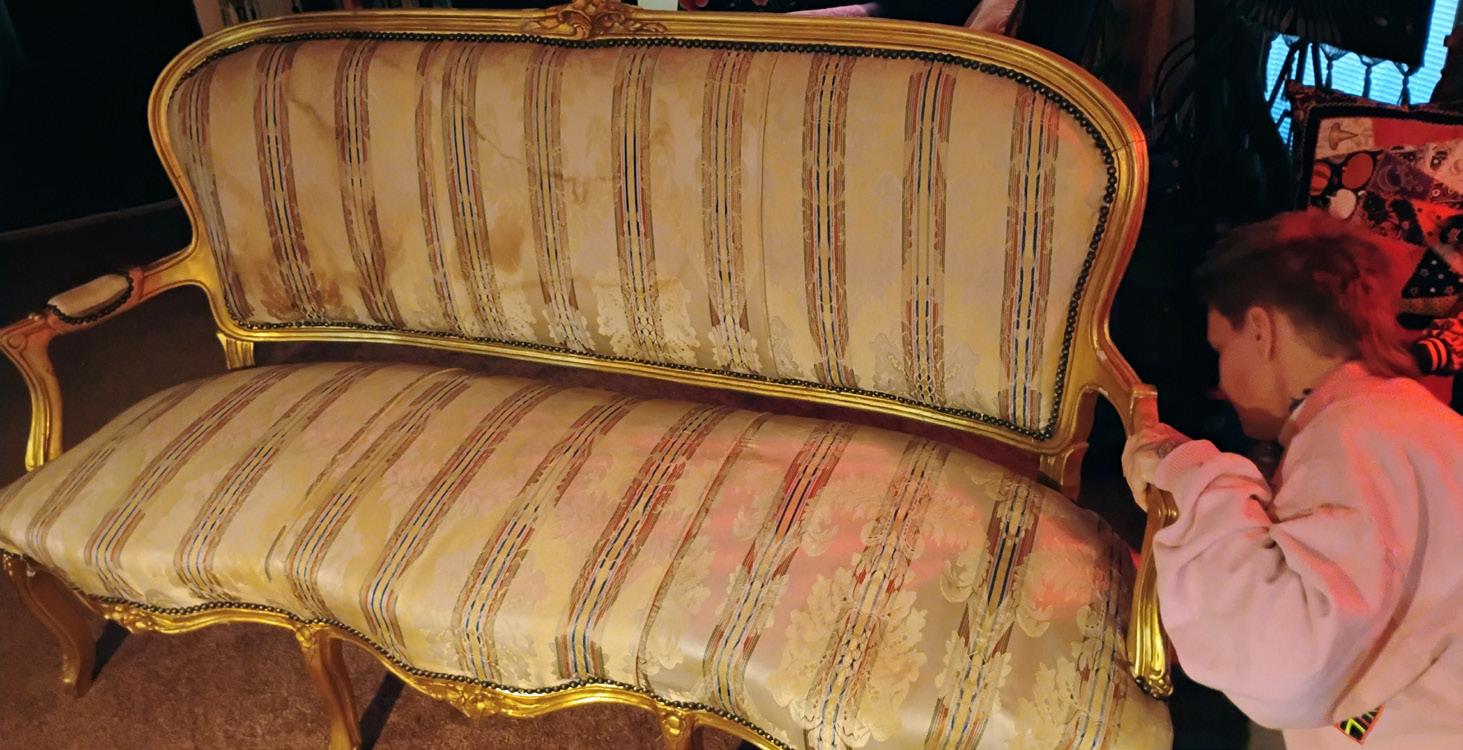
velvet, no pattern.
Hours of scouring and 1 week later, I found this gorgeous floral patterned velvet. I love antique french textiles. (Especially Toile. One piece I own, is from the 1700’s that I repurposed into a decorative pillow for my bedding.) Aside from the provincial scenic toile, another category of patterned fabric was also wildly popular in antiquity- Indienne. Its floral patterned with vines and whimsical flowers. Its really bold, but also subtly feminine. I am in love with Indienne patterns. This velvet I found, is designed in that same Indienne theme, found in antique, french textiles.
What’s even better? I found a textile company in India that sold it to me for $16.00 a yard..... free shipping!!
I also found upholstery grade cotton batting for $10.00 a yard (I loathe polyester. Even though poly was cheaper, I decided it was worth the extra money to buy cotton) and upholstery foam (24”X72”) for the seat, for a mere $19.00! Furniture tacks/nails- 1000 for $6.47 from Temu-free ship. Ball ping hammer and other tools/incidentals from Second Chance downtown, approx. $6.00. Upholstery grade trim $18.00 for 12 yards- free ship. All told, around $140 total. My daughter is splitting it with me, so my out of pocket was around $70, spreading it out over the course of 2 1/2 months. Bought items when I had a few extra dollars. $6.00 here, $10.00 there. Only way I could afford to do so.
I’m currently removing the back padding, furniture tack by furniture tack, to make way for paint and fabric. The back was open, on these old settees.....fabric was inserted on the inside, directly behind the padding. I have to remove everything, in order to insert the fabric.
I think I’ll go with black on the paint. Someone had spray painted it with metallic gold, and I need a darker color for coverage. I’m ‘sanding’ it with a fine steel wool for adhesion’s sake.
In a normal setting, I would have sanded and stained it. But alas, it’s not practical when you live in an apartment.
That’s where we are so far......in the thick of it. There’ll be part 2 when all is finished.
In part, I’m writing this to the homeless community. The cost of finally being housed is not something any of us can afford. Buying brand new furnishings is not financially viable. And the risk of a bed bug infestation when buying used furniture, is just not worth it.
Using your brain and your hands, can provide you with a comfortable living space, without ‘mortgaging’ your future earnings.
Don’t be afraid. No one becomes an expert, by not taking that scary leap into the unknown. I’ve always learned by doing.
I’m also going to state the obvious. We’re a throwaway society. Household items used to last near a lifetime. Now..... we’re paying more, for far less. Especially household items and clothing. We’re lucky if a t-shirt makes it through a few washings anymore. I know personally, that I am constantly repairing clothing & bedding items.
All this waste has to go somewhere. (We’re even shipping our waste to other countries!) It’s not sustainable.
Save the landfill and your money. Express your creativity and personality. Restore an old dress, chair, bookshelf......couch! Repurpose with purpose.
I know this is not my normal emotionally laden content. It’s my birthday this month, so I gave myself the early present of boring you with an article about an old couch, while seriously toying with the idea of reciting the ‘Tale of the Broken Lamp’. I fixed her, painted her, rewired her and hand stitched a brand new silk shade to crown her newly restored magnificence. No side eye allowed.
The real moral to this story is, I get to spend a lot more time with my kids as we work to beautify a ratty, old couch destined for the landfill. That’s truly the best part.
EasterSeals-Goodwill Sets Seniors up for Success
By Molly Balison
As of January 2024, Interfaith Sanctuary has received seventy-six individuals above the age of 65 with open arms. Since 2020, the shelter has seen 120 folks 55 and over come through their doors. The older demographic phasing into their senior years experience difficulty reentering the workforce due to their age.
According to the American Association of Retired Persons, 23% of jobseekers aged 55 and above were long-term unemployed.
Easterseals-Goodwill is a nonprofit located in Idaho, Utah, Montana and Wyoming that provides services to underserved communities such as seniors, disabled, veterans and families with low income. Easterseals partners with Goodwill stores in the northern Rocky Mountains to provide jobs based on the skills that individuals already possess while working with them to build new skills to provide people with supplemental income.
The Idaho branch’s Senior Employment Program connects low income adults over the age of 55 with paid part-time jobs at local nonprofits — including food banks, senior centers, thrift stores, Salvation Army and Interfaith Sanctuary.
“Our community partners, our host agencies,” Easterseals-Goodwill Program Director
Sharon Kierulf said, “kudos to them because they are what provide that hands-on and actual training and help them get on the path where they need to.”
Kierulf came to the emergency shelter to help Director of Project Recovery Terrence Sharrer integrate Easterseals Goodwill’s services into programming in February.
After three years helping Eastereals-Goodwill, Kierulf said, “I wake up everyday and I pour everything of myself into this because I love it — giving back to the community and helping individuals.”
To be eligible, a person must be above the age of 55, be unemployed and a low income household. Most seniors stay enrolled in the program for around one year. “It’s not a forever thing, It is a stepping stone,” Kierulf said.
Skip Murray is the first guest at Interfaith to be enrolled in the program. Despite an impeccable resume, we couldn’t get employed because of his age. He applied to Easterseals Goodwill’s program and Kierulf set up the paperwork for him to get paid for up to 29 hours of work a week inside Interfaith’s shelter.
Murray is an overqualified individual with a resume full of experience, yet his senior age hinders his chances of landing a job in the competitive workforce. This new program
motivates him to be confident in working again, “I just want to grow…It’s shown me a lot of humility. I learned to respect people again.”
Michael Richardson, 58, recalls distributing about 120 resumes and applications without a single interest from an employer. With no real world experience other than driving a semi truck and no mode of transportation to a job, Richardson was at a disadvantage. As a member of project recovery, he worked hard at bettering himself to be free from addiction.
Richardson and Murray serve in whatever capacity the staff needs that day whether it’s washing and folding clothes in the laundry room, checking in guests at the front desk, or cleaning up the courtyard.
“It’s a privilege to be honest with you to work over there,” Richardson said.
Not only does the program set up a line of work for seniors, it helps them become self-sufficient and give them a sense of independence, providing them with networking opportunities, resume refinement and technological training based on their career goals.
“It’s part of our mission,” Sharrer said. It’s just another program, another thing that we show the public that we’re not just a warehouse for people.
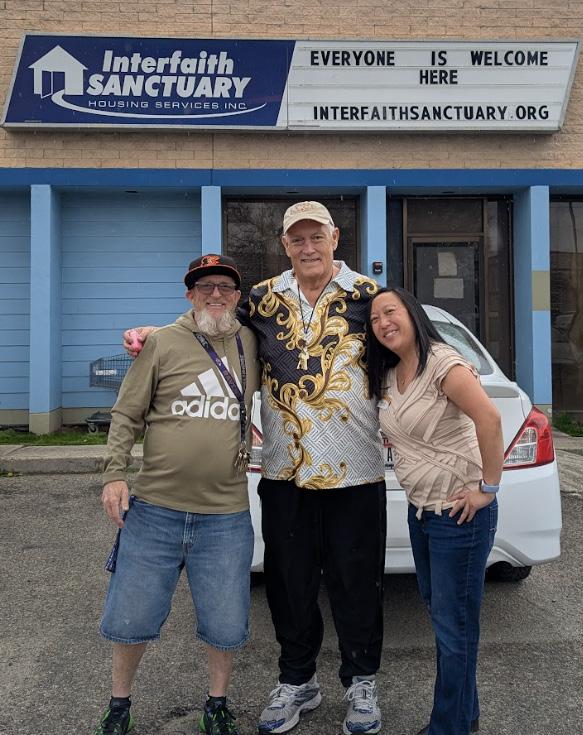
We’re actually doing something productive and getting people back into the community.”
Kierulf encourages folks who are in the slightest interested, even if they have fears and doubts about asking for help, to reach out to Easterseals Goodwill’s phone number (208) 454-8555 or visit the website at www.esgw.org/ scsep to begin the next step toward success.
“The point of this program is to help provide a guiding light for them on a path to a better future,” Kierulf said.
